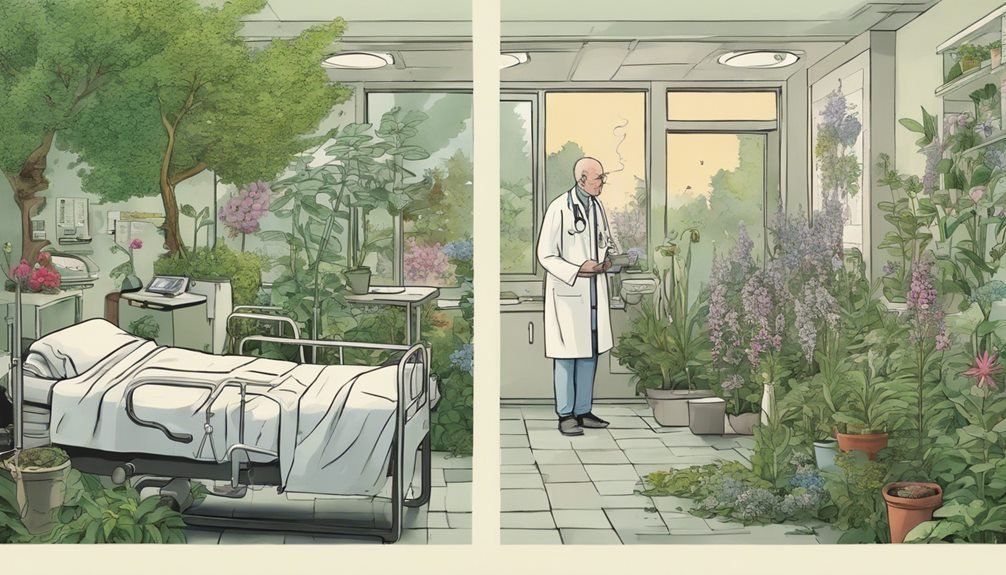Did you know that a recent survey found that up to 40% of cancer patients use complementary or alternative therapies like homeopathy alongside conventional treatments? While the debate on homeopathy's role in cancer treatment continues, exploring the intersection of these two realms can shed light on the complexities and controversies surrounding the topic. Before drawing conclusions, it is crucial to understand the various perspectives, evidence, and implications associated with incorporating homeopathy into cancer care.
Key Takeaways
- Homeopathy's role in cancer treatment lacks robust scientific support.
- Anecdotal evidence and patient testimonials exist.
- Clinical trials show mixed results, warranting further research.
- Homeopathy may aid symptom management and patient well-being.
- Safety, regulation, and consultation with healthcare providers are crucial.
History of Homeopathy
Homeopathy, a system of alternative medicine, was founded in the late 18th century by German physician Samuel Hahnemann. Hahnemann developed the principle of "like cures like," where a substance that causes symptoms in a healthy person can be used to treat similar symptoms in a sick person. This concept laid the foundation for homeopathic treatments.
The historical development of homeopathy saw it gaining popularity in Europe and later spreading to other parts of the world. Hahnemann's publication of "Organon of the Healing Art" in 1810 outlined the fundamental principles of homeopathy, guiding its practice and growth.
Over time, various schools of thought emerged within the homeopathic community, leading to the development of different approaches and remedies.
Understanding the origins and historical development of homeopathy provides insight into its evolution as a holistic form of medicine. By recognizing the roots of this practice, practitioners can better serve their patients by incorporating traditional wisdom with modern healthcare approaches.
Principles of Homeopathic Treatment
Utilizing the fundamental principle of "like cures like," homeopathic treatment involves administering highly diluted substances that would produce similar symptoms in a healthy individual to stimulate the body's innate healing responses. The efficacy debate surrounding homeopathy continues to spark discussions among healthcare professionals and patients alike.
While some patients report success stories and improvements in their well-being through homeopathic treatments, research gaps exist concerning the scientific evidence supporting its effectiveness.
Patient perspectives play a crucial role in understanding the appeal of homeopathic treatment. Many individuals are drawn to its holistic approach and gentle nature, which aligns with their desire for natural and less invasive therapies. However, the lack of robust clinical trials and empirical data contributes to the ongoing debate on the validity of homeopathy in treating various conditions, including cancer.
As you navigate the realm of homeopathic treatment, it's essential to consider both anecdotal evidence and scientific research to make informed decisions about its potential benefits and limitations. Stay curious and open-minded, weighing the success stories shared by patients against the existing research gaps to form a well-rounded perspective on homeopathy's role in healthcare.
Claims of Homeopathy in Cancer Treatment

Are claims of homeopathy being an effective treatment for cancer supported by scientific evidence? Patient testimonials often highlight the perceived benefits of homeopathy in cancer treatment. However, it's crucial to approach such claims with caution due to the controversial nature of homeopathic treatments for cancer.
While some individuals may report positive experiences with homeopathy alongside conventional cancer treatments, these anecdotes don't constitute scientific evidence of its efficacy in treating cancer.
Controversial claims surrounding homeopathy and cancer treatment stem from the lack of robust scientific studies supporting its effectiveness. The scientific community emphasizes the importance of evidence-based medicine, which relies on rigorous research and clinical trials to validate treatment interventions. Without substantial scientific evidence to back these claims, it's challenging to ascertain the true impact of homeopathy on cancer outcomes.
Therefore, when considering homeopathy as a complementary therapy for cancer, it's essential to consult with healthcare professionals and rely on evidence-based practices to make informed decisions about treatment options.
Scientific Studies on Homeopathy and Cancer
Research into the efficacy of homeopathy in cancer treatment has been a subject of interest among scientists and healthcare professionals. Clinical trials evaluating homeopathic remedies in cancer patients have shown mixed results. Some studies suggest potential benefits, such as improved quality of life and symptom management, while others indicate no significant impact on cancer progression or survival rates.
Meta-analysis studies, which analyze data from multiple clinical trials, have also produced conflicting conclusions regarding the effectiveness of homeopathy in cancer care. While some meta-analyses point to positive outcomes, others highlight the lack of robust evidence to support the use of homeopathy as a primary treatment for cancer. It's essential to interpret these scientific studies with caution, considering factors like study design, sample size, and methodological limitations.
Further research and larger, well-designed clinical trials are needed to provide more definitive answers regarding the role of homeopathy in cancer treatment.
Homeopathic Remedies for Cancer Symptoms

Recent discussions on the efficacy of homeopathy in cancer treatment have prompted a closer examination of its potential role in alleviating cancer symptoms. Clinical evidence suggests that certain homeopathic remedies may help manage symptoms associated with cancer, such as pain, nausea, fatigue, and anxiety.
While more research is needed to fully understand the mechanisms behind these effects, some patients have reported positive experiences with using homeopathy alongside conventional cancer treatments. Patient experiences have highlighted improvements in quality of life, reduced side effects from traditional therapies, and enhanced overall well-being.
It's essential for individuals considering homeopathic remedies for cancer symptoms to consult with their healthcare providers and approach these treatments as complementary rather than alternative options. By combining the principles of homeopathy with evidence-based conventional care, patients can potentially benefit from a holistic approach to symptom management during their cancer journey.
Case Studies of Cancer Patients Using Homeopathy
Case studies offer valuable insights into the real-world experiences of cancer patients who've chosen to incorporate homeopathy into their treatment regimen. These studies provide a glimpse into patient outcomes and treatment protocols when homeopathy is used alongside conventional cancer treatments. In some instances, patients reported improvements in their overall well-being, reduction in side effects from traditional cancer therapies, and enhanced quality of life. However, it's essential to note that individual responses to homeopathic treatments can vary significantly, and what works for one patient may not have the same effect on another.
Treatment protocols in these case studies often involved personalized remedies based on the patient's specific symptoms, medical history, and emotional state. Homeopaths tailored their approach to address not only the physical manifestations of cancer but also the emotional and mental toll it takes on patients.
While some patients found relief and comfort through homeopathy, it's crucial to approach these case studies with a critical eye and consider them as part of the broader conversation on integrative cancer care.
Homeopathy vs. Conventional Cancer Treatment

Moving from the realm of individual experiences to the broader landscape of treatment options, the comparison between homeopathy and conventional cancer treatment is a topic that sparks discussions and considerations among patients, healthcare providers, and researchers alike.
When evaluating homeopathy effectiveness versus conventional treatments for cancer, it's essential to consider:
- Scientific Evidence: Conventional cancer treatments like chemotherapy and radiation therapy are backed by extensive research demonstrating their effectiveness in treating various types of cancer.
- Regulatory Approval: Conventional cancer treatments undergo rigorous testing and approval processes by regulatory bodies, ensuring their safety and efficacy before being used in clinical practice.
- Comprehensive Approach: Conventional cancer treatments often involve a multidisciplinary team of healthcare professionals, including oncologists, surgeons, and nurses, working together to provide comprehensive care tailored to each patient's specific needs.
While some individuals may choose to complement conventional treatments with homeopathy, it's crucial to consult with healthcare providers to ensure that the chosen treatment approach is safe and evidence-based.
Side Effects and Risks of Homeopathy
When considering the use of homeopathy for managing health conditions, including cancer, it's essential to be aware of potential side effects and risks associated with this alternative therapy. Efficacy assessment is crucial in determining the effectiveness of homeopathic treatments. While some individuals may find relief from symptoms, it's important to note that scientific evidence supporting the efficacy of homeopathy in treating cancer is lacking.
Patient compliance is another factor to consider when discussing the risks of homeopathy. Due to the nature of homeopathic remedies, which often involve frequent dosing and specific administration instructions, patient adherence can be challenging. Inconsistent use of homeopathic treatments can impact their potential effectiveness and lead to dissatisfaction with the therapy.
It is important to approach homeopathy with a critical eye, considering both the potential benefits and risks. Consultation with healthcare professionals is advised to ensure a comprehensive understanding of the implications of using homeopathy, especially in cancer treatment.
Regulation and Safety of Homeopathic Products

Exploring the landscape of homeopathic treatments extends to considering the regulation and safety of the products involved. When it comes to homeopathic products, regulatory oversight and product safety are crucial aspects to understand. Here are some key points to consider:
- Regulatory Oversight: Homeopathic products are regulated differently in various countries. In the United States, the Food and Drug Administration (FDA) regulates these products under specific guidelines. However, the regulations may vary in other regions, so it's essential to be aware of the governing bodies in your area.
- Product Safety: While homeopathic products are generally considered safe when used as directed, it's important to be cautious of potential interactions with other medications or substances. Always consult with a healthcare professional before starting any new treatment, especially if you're undergoing cancer therapy.
- Quality Control: Ensuring the quality and purity of homeopathic products is essential for their effectiveness and safety. Look for products that have been tested for purity and potency by reputable manufacturers to minimize any risks associated with their use.
Personal Stories of Homeopathy and Cancer
Within the realm of cancer treatment, individuals often turn to alternative therapies like homeopathy for a sense of empowerment in their healing journey. Survivor testimonials reveal a range of treatment experiences with homeopathy.
Some individuals report feeling supported and comforted by the holistic approach of homeopathy, which focuses on treating the whole person rather than just the disease. They express gratitude for the personalized care and attention they received from homeopathic practitioners.
Survivor testimonials also highlight varying results from using homeopathy as a complementary therapy alongside conventional cancer treatments.
While some individuals attribute improvements in their overall well-being and quality of life to homeopathy, others may not have experienced the same level of benefit. It's important to note that personal experiences with homeopathy and cancer treatment can vary greatly, and what works for one individual may not necessarily work for another.
Expert Opinions on Homeopathy for Cancer

Are homeopathic treatments effective in managing cancer symptoms and improving outcomes? Expert opinions on homeopathy for cancer vary, with some healthcare professionals supporting its use alongside conventional treatments, while others remain skeptical. When considering the efficacy of homeopathy in cancer care, it's crucial to look at both clinical trials and patient experiences.
Here are key points to consider:
- Clinical Trials: Many studies investigating the efficacy of homeopathy in cancer treatment have shown conflicting results. While some trials suggest potential benefits in alleviating symptoms and improving quality of life, others have found no significant difference compared to a placebo.
- Patient Experiences: Some cancer patients have reported positive outcomes with homeopathic treatments, citing improved well-being, reduced side effects of conventional therapies, and better emotional support. However, individual experiences can vary, and it's essential to approach such anecdotes with caution.
- Expert Insights: It's important to seek guidance from healthcare providers who are knowledgeable about both conventional cancer treatments and complementary therapies like homeopathy to make informed decisions regarding cancer care.
Conclusion: The Verdict on Homeopathy and Cancer
In assessing the intersection of homeopathy and cancer, it becomes imperative to scrutinize the amalgamation of scientific evidence, clinical findings, and patient perspectives. Research findings on homeopathy's efficacy in treating cancer remain inconclusive due to a lack of robust scientific evidence supporting its effectiveness. While some studies suggest potential benefits, the overall consensus within the medical community leans towards conventional treatments backed by substantial research.
Patient testimonials often highlight individual experiences of improvement or relief from homeopathic treatments. While these anecdotes can be compelling, they don't provide conclusive evidence of homeopathy's effectiveness in treating cancer. It's crucial to approach such testimonials with caution, considering the placebo effect and the subjective nature of personal experiences.
Frequently Asked Questions
Can Homeopathy Cure Cancer Completely?
While some proponents claim homeopathy can cure cancer completely, the efficacy debate remains ongoing. It's essential to consider the long-term effects and consult with medical professionals for evidence-based treatment options. Homeopathy's role in cancer treatment should be approached cautiously, considering the gravity of the disease. Seek guidance from healthcare providers to make informed decisions about your treatment plan.
Are There Any Interactions Between Homeopathy and Conventional Cancer Treatments?
When it comes to interactions between homeopathy and conventional cancer treatments, safety concerns arise due to potential effects on treatment outcomes. Efficacy studies are limited, leaving uncertainty about the overall impact.
It's crucial to consult healthcare providers before combining therapies to ensure compatibility and effectiveness. Remember, "two heads are better than one" when seeking comprehensive care that considers all factors for optimal results.
How Long Does It Take to See Results With Homeopathic Cancer Treatment?
Typically, the efficacy timeline for homeopathic cancer treatment varies among individuals. Patient expectations play a crucial role in this process, as some may notice improvements in symptoms sooner than others. It's essential to work closely with a qualified healthcare provider to monitor progress and adjust treatment as needed.
While some patients may see results relatively quickly, others may require more time before experiencing significant changes. Patience and consistent communication with your healthcare team are key.
Can Homeopathy Help With Cancer-Related Pain Management?
When dealing with cancer, finding ways to ease pain is crucial. Homeopathy offers a potential avenue for pain relief and symptom management. While not a standalone cure, it can complement traditional treatments.
Are There Specific Homeopathic Remedies for Different Types of Cancer?
When it comes to homeopathic remedies for various cancers, efficacy studies remain limited. While some patients report positive experiences with certain remedies, evidence supporting their specific efficacy against different cancer types is lacking.
It's crucial to consult with healthcare professionals for comprehensive cancer treatment. Your health and well-being are top priorities, and a personalized approach based on scientific research is essential for addressing cancer effectively.
Conclusion
You've navigated through the murky waters of homeopathy and cancer, weighing personal stories and expert opinions. Like a diver exploring the depths of the ocean, you've encountered conflicting claims and sparse scientific evidence. As you resurface, remember to tread carefully, guided by the beacon of evidence-based medicine. The verdict on homeopathy and cancer remains elusive, hidden in the shadows of uncertainty. Only through further research and collaboration can the truth be illuminated.





